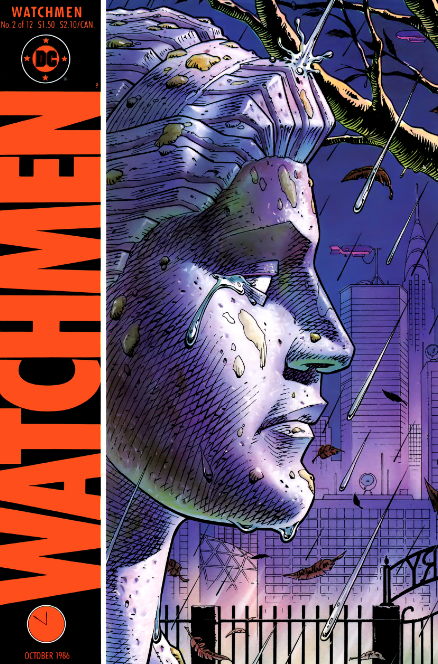 Chapter II: Absent Friends
Chapter II: Absent Friends
( A quote from Elvis Costello:
”And I'm up while the dawn is breaking, even though my heart is aching. I should be drinking a toast to absent friends instead of these comedians.”)
It's the morning of the funeral of Eddie Blake, but Lori does not want to attend the Comedian's burial and so has instead gone to visit her mother. She is shocked to find out that the woman who used to be the Silk Specter, Sally Jupiter, still has feelings for Blake, after what he did, but her mother says the past is history. This leads to recollections about Sally's own past, when she was part of the Minutemen, and she remembers vividly the time Eddie Blake attacked and tried to rape her, she only being saved by the intervention of one of the other superheroes, Hooded Justice. At the graveside, we see a sad and thoughtful Adrian Veidt, as his own memories drift back to a time we're not told the date of, but I'm thinking it's somewhere in the sixties or seventies. He remembers another grouping of superheroes, who called themselves The Crimebusters, but quickly disbanded when it became clear there really was no real interest there. We see Rorschach and Nite Owl, two of the few (other than the organiser, Captain Metropolis) who seem to be into the idea, though Rorschach believes the group is too big and cumbersome, and will only get in the way of the work.
The Comedian spits on the idea, laughing at how little the others seem to know of the world and how futile their attempts to change it will be, must be. “Inside thirty years”, he sneers, “the nukes will be flying like mayflys. Then Ozzy (Veidt, whose alter-ego was Ozymandius) here will be the smartest man on the cinder!” Back at the graveside, we now see the memories of the enigmatic Doctor Manhattan, as he recalls the victory in Viet Nam, 1971. He is keeping company with The Comedian, who tells him he can't wait to get out of the place, when a woman approaches. She is evidently carrying Blake's baby, but he is not interested. Enraged, hurt, she slashes him with a bottle and he shoots her down like a dog, despite Manhattan's protests.
Next to remember is Nite Owl, and he recalls a police strike which resulted in riots on the street as the superheroes (specifically, he and The Comedian) took control and tried to restore order. He notes that Blake seems to be happiest when he's making the crowd run, throwing tear gas cannisters and basically acting like a riot cop, whereas Danny is more worried about maintaining order but not hurting anyone. The Comedian seems to treat the whole thing as a massive joke, an adventure; it seems to fire his blood and Danny must wonder what sort of person could actually enjoy and look forward to scenes like these?

As he leaves the cemetery, a man in an overcoat is shadowed by Rorschach, who knows the stranger as Moloch, one of his arch enemies. Moloch tells Rorschach, after he's been beaten up a little, that he has renounced being a supervillain, paid his debt to society and now just wants to live as an ordinary citizen. He tells Rorschach that Blake came to visit him, without his mask but wearing his costume, so that his old enemy could tell they were one and the same. Blake was drunk, he tells Rorschach, and started babbling about some list, and then an airship and an island, saying he wished he had never got involved. This was all a week before he died. He talked about writers, Moloch tells Rorschach; writers and artists and scientists, all on that island, and he seemed to shudder at what was being done there. And then he left.
QUOTES
Blake: “Once you figure out what a joke everything is, bein' The Comedian is the only thing that makes sense!”
Doctor Manhattan: “Blake! She was pregnant! You gunned her down!”
Blake: “Yeah that's right. Pregnant woman and I gunned her down. Bang! And you know what? You watched me. You coulda changed the gun into steam or the bullets into mercury or the bottle into snowflakes. You could have teleported either of us to Australia, but you didn't lift a finger. You don't really give a damn about human beings. I've watched you.”
Rorschach (from his journal): “42nd Street: women's breasts draped across every billboard, every sign, littering the sidewalk. Was offered French love and Swedish love, but not American love. American love, like Coke in green glass bottles, they don't make it anymore. Thought about Moloch's story on way to cemetery. Could all be lies. Could all be part of a revenge scheme, planned during his decade behind bars. But if true, then what? Puzzling reference to an island. Also to Doctor Manhattan. Might he be at risk? So many questions. Never mind: answers soon. Nothing is insoluble. Nothing is hopeless. Not while there's life.”
Rorschach (from his journal): “Heard joke once: man goes to doctor, says he feels depressed. Says life is harsh and cruel. Says he feel all alone in a threatening world, where what lies ahead is vague and uncertain. Doctor says "Treatment is simple. Great clown Pagliacci is in town tonight. Go see him. Should pick you up." Man bursts into tears. "But Doctor, he says, I
am Pagliacci!”
Between the Lines
The very first panel shows a statue of an angel in a graveyard, as we witness the arrival of Blake's coffin to the cemetery, and a speech bubble offscreen says “Will you look at her! Pretty as a picture, and still keeping her figure!” The comment is from Lori's mother, directed at her daughter in a sort of offhand jealous/spiteful way, but the positioning of it makes it look like someone is talking about the angel.
As the gates are closed for the ceremony, we see a hand holding a sign down which the rain trickles, leaking down the pole onto the hand. In the next panel we can see it's a doomsayer, plying his trade outside the graveyard. In the background, on the other coast, Lori's mother says “In the end, you just wash your hands of it.”

When Lori's mother asks “Without your health, where are you?” we see again the scene as Blake is lowered into his grave, and in the next panel Lori, annoyed at her mother's attempts to get rid of the smoke from the cigarette she is smoking stubs it out and says testily “There! It's dead. Extinguished.” She might well be talking about Blake.
Lori's mother snarls “It rains on the just and the unjust alike” and we see Adrian Veidt under an umbrella at the funeral. Is he just or unjust? Time will tell, but keep a close eye on the multi-millionaire industrialist.
As Sally breathes “Life goes on, honey” outside the cemetery we see a man walking up and down with a placard that refutes this: “The end is nigh!” it howls. I have my suspicions about the signbearer too, but I don't remember if I'm right so will reserve judgement for now.
Time for some more on-point graffiti: as the smoke clears and Nite Owl and The Comedian walk away, having dispensed the crowds, a rioter with a handkerchief pressed to her nose and mouth stands at one of the walls and again spraypaints the words “Who watches the Watchmen?”
As Rorschach walks past a seedy movie theatre, the attraction is “Enola Gay and the Little Boys”. Obviously, Enola Gay was the B-29 which dropped the atom bomb on Hiroshima and Little Boy was the bomb itself, but even aside from that, the inference of underage homosexual acts is hard to miss.
Those clever little touches
I still find it amazing that this comic book manages to play like TV at times. In one panel (a sequence of three, reproduced below) Lori's mother holds an old photograph of her and the Minutemen, the superheroes from the forties, of whom Night Owl, the Comedian and herself were part, and a tear drops on it. Light shines on the tear. Next panel, a camera flashes and then in the third panel we're back in time as the camera flashes again and the picture she now holds is originally taken. I could see that working onscreen, easily: it may have, I don't recall that much about the movie. But to be able to get that across in a few graphics drawn on paper is truly amazing.
It's interesting too to note that when Hooded Justice rescues Lori's mother, he must believe that there is something in what the Comedian suggested, ie that she asked for it. Rather than help her up or comfort her or ask if she is okay, he stands over her like a judgment, looming down in a personification of distaste and disgust, and growls “Get up, and for god's sake, cover yourself!” as if the sight of her half-naked is both an affront to his sensibilities, and proof of what she has just been involved in.
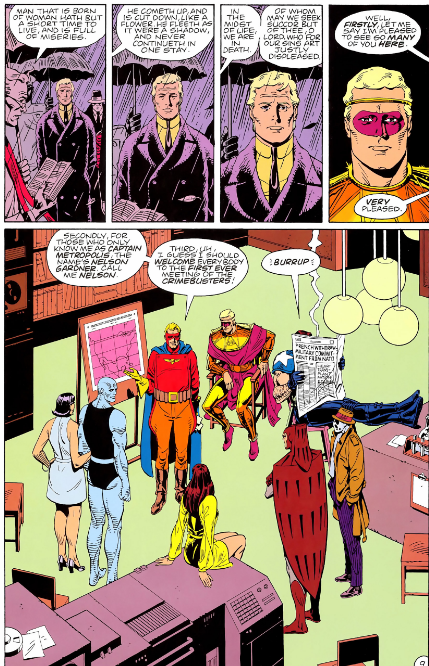
Another fantastic little link: when we go back to the past, as the new superhero squadron to be known as The Crimebusters (yeah)

fall very quickly apart under the withering contempt of The Comedian, Captain Metropolis, who had organised the group (this was to have been their first meeting) stammers “Somebody has to do it, don't you see? Somebody has to save the world!” While he's protesting about this as everyone leaves, as he appeals for support, we see the thoughtful face of Adrian Veidt, in his mask, then cut back to the present, his face is there again, now without the mask but as pensive as ever. Someone has to save the world? He believes this, and he believes too that he is that someone. And he will. He will save the world. But the world may wish he had not bothered.
And another good one: as The Comedian accuses Doctor Manhattan of being out of touch and not caring for humans, the big blue giant strikes a certain thoughtful pose. As his memories return him to the present and the graveside, he is again in that exact pose.
I'm sure it's coincidence (or maybe not) but when The Comedian shoots at a rioter, the flare from his gun looks like the happy face badge he wears, his own insignia.
As others toss in earth on the coffin, as per our custom, Danny drops his happy face badge (cleaned of blood now) onto the wooden box. It's certainly not the biggest fall this little piece of tin has had recently, but it is the last.
As Rorschach visits the grave of The Comedian to pay his last respects, we see once again Blake's final fall played out, and the last panel of that fall is totally red, signifying obviously the blood as he hits. The next panel shows blood-red roses (which we've already seen and which Rorschach has remarked upon -”Only our enemies leave us roses”) with rain dripping on them, and the symbolism could not be stronger, as Rorschach snips one off and sticks it in his lapel.
After the storm: Under the Hood
Mason goes on to describe how he became a superhero, the challenges that existed even in as seemingly simple a thing as designing his costume - “Should I have a cape, or no cape? What sort of a mask should I have? Do bright colours make you more of a target than dark ones?” - and how he eventually joined the emerging league of superheroes (or masked adventurers, as he prefers to refer to them, and probably more accurately, since as has already been pointed out in the first chapter, these guys had no actual superpowers), together mostly for publicity purposes in the forties, the Minutemen. He alludes strongly to The Comedian's attempt to rape Sally Jupiter, but oddly informs us that Hooded Justice and she were an item (“though I never saw him kiss her”), perhaps making sense of his cold reaction to her almost-rape at the time. He recalls the tragic death of Dollar Bill, one of the younger heroes, who was actually contracted to protect a particular bank, and whose cloak got entangled in the bank's revolving doors, leading to him being shot dead.
He also notes the damage being a superhero or masked adventurer had on some of the people he knew, some ending up in asylums, some dying, some marrying. He speaks too of how while the Minutemen were prancing about America's city skylines, dealing out justice, “Across in Europe they were making soap and lampshades out of human beings” and mentions that some of the heroes held what could only be deemed questionable attitudes, some supporting Hitler, some making racist slurs. By the end of the forties, he tells us that there was simply “Nobody interesting left to fight, and nothing worth talking about”, so they disbanded. But, he says with a sigh, the damage had already been done.
The story so far
All of the ex-superheroes (or as many as are left alive or at liberty) gather at the graveyard to bid farewell to their comrade, as Edward Blake, formerly known as The Comedian, begins his final journey. Thoughts of each drift back to the past, and some of the events we have been told about or which have been alluded to are explored and in part explained, particularly the almost-rape of Lori's mother. Rorschach meets Moloch, one of their old enemies, who has retired now and is dying of cancer. He tells him that Blake visited him about a week before he was found splattered all over the pavement, and spoke in a drunken fog about a mysterious island and some very nefarious things that were going on there, things he was involved in in some way.
Note: incidentally, I was wrong about the clock at the end of chapter one. It actually stands at eleven minutes to twelve, since by the final chapter we want to hit midnight, not one minute to. So chapter two then ends with the clock at ten minutes to the witching hour...
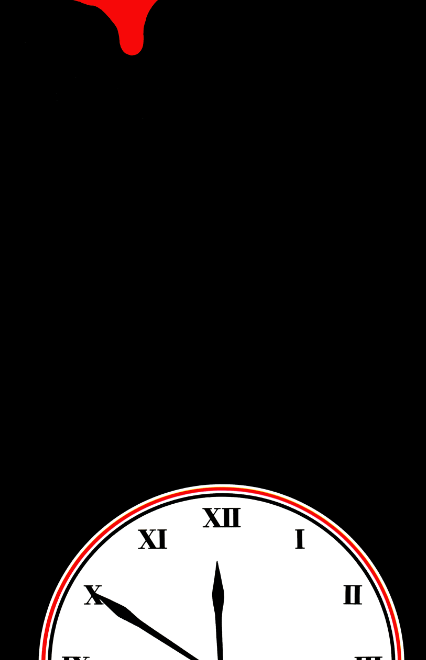







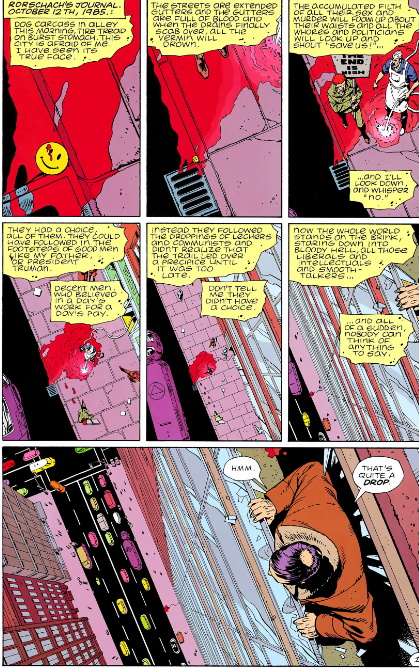

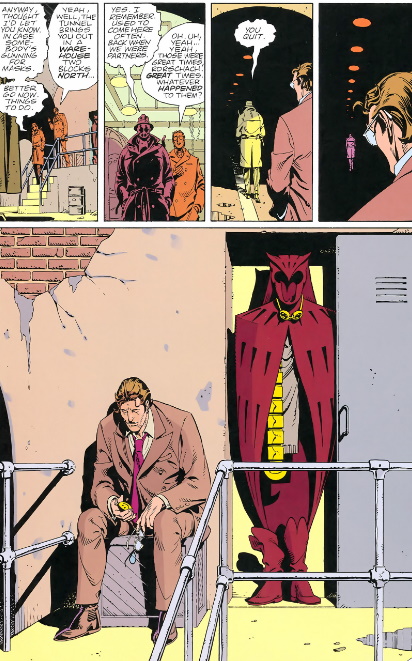
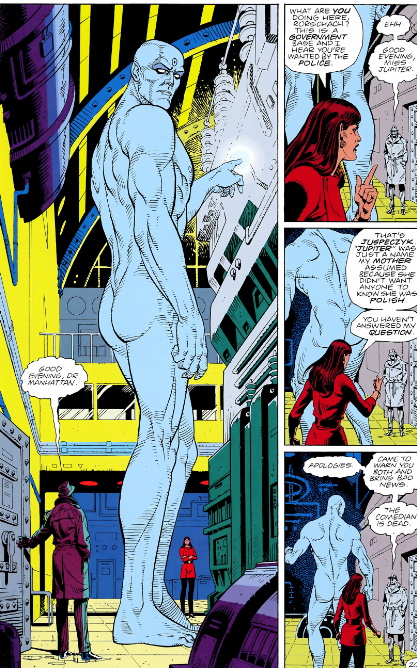




 fall very quickly apart under the withering contempt of The Comedian, Captain Metropolis, who had organised the group (this was to have been their first meeting) stammers “Somebody has to do it, don't you see? Somebody has to save the world!” While he's protesting about this as everyone leaves, as he appeals for support, we see the thoughtful face of Adrian Veidt, in his mask, then cut back to the present, his face is there again, now without the mask but as pensive as ever. Someone has to save the world? He believes this, and he believes too that he is that someone. And he will. He will save the world. But the world may wish he had not bothered.
fall very quickly apart under the withering contempt of The Comedian, Captain Metropolis, who had organised the group (this was to have been their first meeting) stammers “Somebody has to do it, don't you see? Somebody has to save the world!” While he's protesting about this as everyone leaves, as he appeals for support, we see the thoughtful face of Adrian Veidt, in his mask, then cut back to the present, his face is there again, now without the mask but as pensive as ever. Someone has to save the world? He believes this, and he believes too that he is that someone. And he will. He will save the world. But the world may wish he had not bothered.
 Linear Mode
Linear Mode
